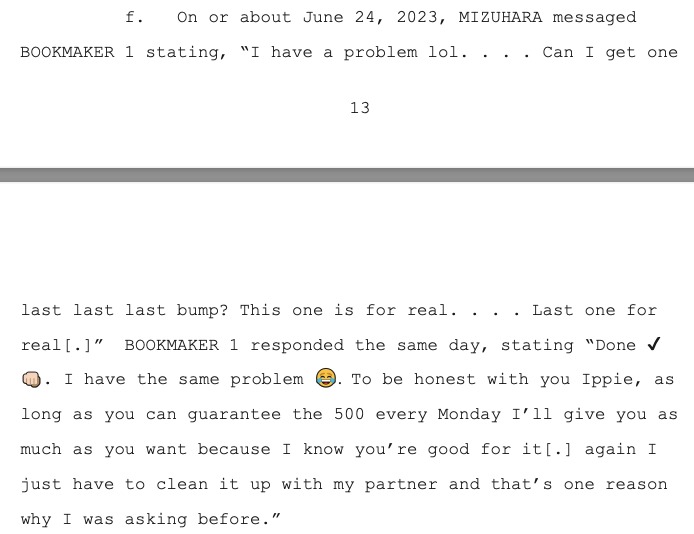According to the affidavit, Mizuhara texted the bookmaker, “Technically I did steal from him. It’s all over for me,” on the day the story first broke.
According to the New York Times, Mizuhara is negotiating for a plea deal.
Throughout the affidavit, Ohtani is referred to as “Victim A” and, in a press conference, US Attorney Martin Estrada said “Mr Ohtani is considered a victim in this case.” Major League Baseball released a statement saying that it “will wait until resolution of the criminal proceeding to determine whether further investigation is warranted”.
Since the story broke 20 March, Ohtani, the two-way Japanese baseball star who signed baseball’s richest contract during the off-season, has maintained that he was duped. Thursday’s filing appears to support the claim that Ohtani is considered a victim.
Mizuhara’s betting part of a bigger investigation
Mizuhara, who was also Ohtani’s manager and handled daily tasks for him, is expected to appear in court on Friday (12 April) and, according to ESPN, his lawyer declined to comment Thursday.
Mizuhara’s betting is linked to a massive illegal bookmaking ring with ties to former minor-leauge baseball player Wayne Nix that the federal government has been investigating. Nix is not named in the affidavit, nor is Mathew Bowyer, the Orange County-based illegal bookmaker who allegedly took Mizuhara’s bets. Although Bowyer is unnamed, details in the affidavit point to his identity.

So far, Seymour wrote, the investigations have resulted in “criminal charges and/or convictions of 12 criminal defendants and one money-service business”. The investigation is ongoing.
In the affidavit, Seymour details how Mizuhara changed the contact information on Ohtani’s account to Mizuhara’s cell phone number and email address. Mizuhara also “falsely identified himself” to bank authorities and told Ohtani’s financial advisors that the baseball player was denying them access to his accounts.
Mizuhara initially set up the bank account into which Ohtani’s Los Angeles Angels salary was deposited in 2018. While Mizuhara used funds from Ohtani’s account to fund his gambling and cover his debt, the former interpreter had winnings deposited into his own account.
Gambling quickly got out of control
According to the affidavit, the interpreter began gambling in September 2021, and quickly began to rack up debt. He did not bet on baseball, but did bet on a range of other sports.
As early as November 2021, Mizuhara was already running into problems paying his debts. According to text messages in the affidavit, in some cases he could not write funds and attempts at PayPal transfers were cancelled. Mizuhara called the process “super stressing”.
While Mizuhara struggled to pay the bookmaker, the bookmaker continued to extend Mizuhara’s credit and offer him free-play options. While Mizuhara often asked for increases in credit, in March 2022, he asked the bookmaker to lower his limit to $100,000, saying that he would “get too reckless with 300”.
By November 2023, according to text records, Mizuhara knew that he was in trouble. He texted the bookmaker, who was demanding payment, saying that he had “ended up losing a lot of money on crypto” and that he “took a huge hit obviously with the sports too”. He also asked the bookmaker if he could settle.
When he was betting, Mizuhara bet an average of $12,800 per wager, according to the affidavit. The size of the bets ranged from $10 to $160,000 and Mizuhara placed a total of about 19,000 bets, or an average of 25 bets per day. In total, Mizuhara placed $142.3m in winning bets and $182.9m in losing bets, leaving him $40.7m in debt.
Original article: https://igamingbusiness.com/sports-betting/feds-ohtani-considered-a-victim/













